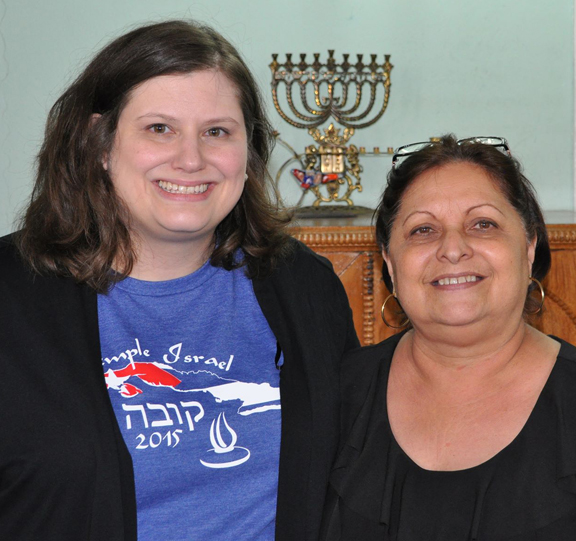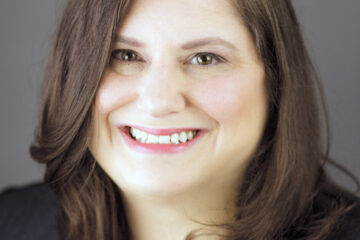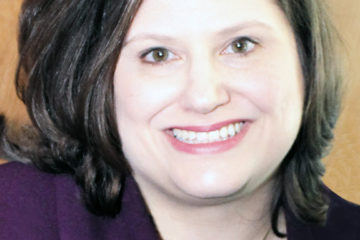Responsible for one another

By Rabbi Karen Bodney-Halasz, Temple Israel
The Talmud states, kol Yisrael aravim zeh b’zeh, all Israel is responsible for one another (Shevuot 39a). To me, this teaches that Judaism is rooted in relationships; a Jew cannot live in a vacuum. We are connected one to the other — in our faith, our history, and our future. For better or worse, we are obligated to pay attention to what is happening around us. We celebrate each other’s successes, carry communal guilt when one of us sins, and lift up those who are fallen.
This is why I organized a humanitarian mission to Cuba. Most people are unaware that there even is a Jewish community in Cuba, and even fewer are aware of its struggles. We tend to have blinders around us that shield us from seeing all the need in our world, especially in other countries. That is, unless we forge personal connections. And that was exactly what we set out to do when we travelled to Cuba: not only to forge connections with Cubans, but among ourselves as well. Our group of 20 was made up of Temple Israelites of all generations, including members confirmed at Temple Israel who later moved across the United States and abroad.
The Cuban Jewish community was formally founded in 1901 and by the 1920s it was home to nearly 25,000 Jews. It dwindled to less than 700 by 1985, as a direct result of the Cuban Revolution.
Today, the Jewish community boasts nearly 1,500 people, though we were told this number is highly inflated. The resurgence of the Jewish community didn’t come easily. The “Jubans” have worked hard to rebuild their community and reestablish houses of worship, religious schools, Jewish cemeteries, and programming for the young and old.
Daily life in Cuba is hard; the people are poor and earn very low wages. Cubans cannot comprehend the luxuries we Americans consider necessities. As I watched a Cuban child jump with joy when I handed him a coloring page and marker, I reflected on my own child, leaving caps off of his art supplies without a second thought. It was a healthy reminder to appreciate all that we have and to acknowledge that we often have more than we actually need.
Fortunately, the Cuban community receives support from generous Jews abroad. For the past 20 years, communites have lent humanitarian support through missions like ours. The American Jewish Joint Distribution Committee also provides funding for a rabbi to visit Cuba a few times during the year.
In addition to providing monetary tzedakah donations to each congregation we visited, our group also brought hundreds of pounds of gifts including much-needed items such as medications, medical supplies, school supplies, personal hygiene items, art supplies, clothing, eyeglass frames, sheets, towels, pre- and post-natal care items, and Judaica.
The congregations showed great appreciation for these donations. When we met with their leaders — all of whom happen to be women — it was evident that though the Jewish community in Cuba may be small, it is proud. Each community offered us a unique perspective of Jewish life.
When we met with Dr. Mayra Levy, president of the Sephardic Center in Havana — and a professor of pharmacology at Havana’s University of Medical Sciences — we learned about the senior center run at the Sephardic Center. The aging community spends much of its day working on crafts and eating its meals there. For some, it is the only way to eat three full meals a day.
After listening to all these community members do for each other, I asked Dr. Levy what she would want me to tell people back home. She responded simply: “to remind them that we are here.”
We also met with Adela Dworin, president of Beth Shalom (El Patronato), Havana’s Conservative congregation and community center. Ms. Dworin was clearly a seasoned fund-raiser, likely out of necessity.
When we presented her with our tzedakah envelope, she jokingly responded, “Thank you very much. You should come more often and bring me envelopes like this!”
She shared with us the many ways in which the community has benefited from generous American tourists, in particular, Steven Tisch, co-owner of the New York Giants. During his visit to El Patronato, Ms. Dworin was able to convince Tisch to help fund Cuba’s first official delegation in more than 50 years to participate in the 2013 Maccabiah games in Israel.
We spent Shabbat at Ms. Dworin’s congregation, and her members were proud to share their Shabbat traditions with us and to offer tours of their library and pharmacy. The synagogue was filled with guests from abroad, and services were led by several youths who personalized the service, assigning families different verses of Lecha Dodi. I was honored to lead Kiddush for the community before we shared dinner together, which for many, offered the only chicken they would eat that week.
In Cienfuegos, we met in Rebecca Langus’ apartment, where she regularly holds Shabbat services. She introduced us to her son David, an artist, who was one of those to participate in the Maccabiah delegation. She proudly showed us her selection of Jewish books in Spanish and explained that what the children in her community learned about Judaism was a result of this small library.
Ms. Langus described the older generations who had worked hard over the years to keep Jewish life in Cuba alive, and then also shared with some sadness that many young people in Cuba are making aliyah (immigrating to Israel).
With programs like Taglit-Birthright and March of the Living, youths have travelled to Israel and fallen in love with her. And a life in Israel provides financial and religious opportunities that don’t exist in Cuba, at least not at this time. Nearly 700 Cuban Jews have made aliyah over the last decade.
Undoubtedly, we were in Cuba at an exciting time. Following the December announcement of thawing relations with the United States, there was a palpable optimism among the people. There is hope that the economy and quality of life will improve, though it was clear that the infrastructure to support a massive influx of American visitors is not yet in place.
Hopefully, as things get better for the people in Cuba, the youths will be more inclined to stay and carry on the unique “Juban” culture they have created.
I was struck by the richness of their culture and strong Cuban identity. At every meal and on every corner was at least one talented musician. The arts are highly regarded in the country and have never ceased to thrive, even in a suffering economy. A third of our time in Cuba was spent experiencing this cultural vibrancy. We listened to beautiful choral voices, enjoyed modern and traditional dance performances, and explored the modern art museum. Sculptures graced public spaces. We even visited the home of artist José Rodríguez Fuster, whose artwork has taken over the neighborhood. It was breathtaking.
Before visiting Cuba, I understood that the story of its Jews was one from which I would draw inspiration. Yet, I was unprepared for how powerful this experience of Cuba would be for myself and for others.
I overheard individuals commenting how the efforts to maintain Jewish life against such odds inspired them to become more involved in synagogue life back home. It was then that I realized that along with learning a great deal about Cuban Jewry on our trip, many of us also learned about ourselves and developed a deeper and richer appreciation for all the services available to our Jewish community in Dayton.
To read the complete July 2015 Dayton Jewish Observer, click here.




